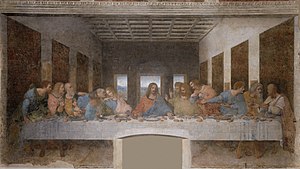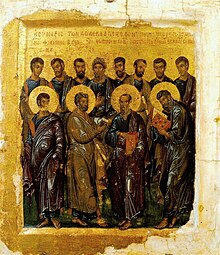
The Last Supper, a late 1490s mural painting by Leonardo da Vinci, is a depiction of the last supper of Jesus and his twelve apostles on the eve of his crucifixion.
According to the Bible's New Testament, the Apostles are the primary disciples of Jesus of Nazareth, the central figure in Christianity. During the life and ministry of Jesus in the first century AD, the apostles were his closest followers and became the primary teachers of the gospel message of Jesus. Often the word "disciple" is used interchangeably with "apostle" – for instance the Gospel of John makes no distinction between the two terms. In modern usage, prominent missionaries are identified as apostles – a practice which stems from the Latin equivalent of apostle, mission, the source of the English word "missionary"
While Christian tradition often refers to the apostles as being twelve in number, different gospel writers give different names for the same individual, and apostles mentioned in one gospel are not mentioned in another. The commissioning of the Twelve Apostles during the ministry of Jesus is recorded in the Synoptic Gospels. After his resurrection, Jesus sent eleven of them (minus Judas Iscariot, who by then had died) by the Great Commission to spread his teachings to all nations—an event referred to as the "Dispersion of the Apostles". There is also an Eastern Christian tradition derived from the Gospel of Luke of there being as many as Seventy Apostles during the time of Jesus' ministry. Prominent figures in early Christianity were often called apostles even though their ministry or mission came after the life of Jesus.
The period of Early Christianity during the lifetimes of the apostles is called the Apostolic Age. During the first century, the apostles established churches throughout the territories of the Roman Empire and according to tradition through the Middle East, Africa, India, and modern-day Ukraine. The apostle Paul, a Jew named Saul of Tarsus, is considered "the apostle of theGentiles",[Romans 11:13] for his missions to spread the gospel message after his conversion. Although not one of the apostles commissioned during the life of Jesus, Paul claimed a special commission from the resurrected Jesus. In his writings, the epistles to Christian churches established throughout the Levant Paul did not restrict the term "apostle" to the Twelve, and often refers to his mentor Barnabas as an apostle. The restricted usage appears in Revelation.
By the second century AD, association with the apostles was esteemed as evidence of authority and such churches are known as Apostolic Sees. Paul's epistles were accepted as scripture, and two of the four gospels were associated with apostles, as were other New Testament works. Various Christian texts, such as the Didache and the Apostolic Constitutions, were attributed to the apostles. Bishops traced their lines of succession back to individual apostles, who were said to have dispersed from the Apostles. Jerusalem and established churches across great territories. Christian bishops have traditionally claimed authority deriving, by apostolic succession, from the Twelve. In addition, have made the people in the christian church think, that they are higher than an apostle and that is far from the truth. Early Church Fathers who came to be associated with apostles, such as Pope Clement I with Peter the Apostle, are referred to as Apostolic Fathers. The Apostles' Creed, popular in the West, was said to have been composed by the apostles themselves. The Twelve Apostles are also called theTwelve Disciples. Several Christian and local traditions honour major missionaries as apostles—for example, Saint Patrick (AD 373–463) as "Apostle of Ireland" or Saint Boniface(680–755) as "Apostle to the Germans".
The word "apostle"(disciples) comes from the Greek word ἀπόστολος (apóstolos), formed from the prefix ἀπό- (apó-, "from") and root στέλλω(stéllō, "I send", "I depart") and originally meaning "messenger, envoy". It has, however, a stronger sense than the word messenger, and is closer to a "delegate". The Greek-English Lexicon of the New Testament argues that its Christian use translated a Jewish position known in Hebrew as the sheliach (שליח). This ecclesiastical meaning of the word was later translated into Latin as missio, the source of the English "missionary".
In the New Testament, the names of the majority of the apostles are Hebrew names, although some had Greek names. Even Paul, the "apostle of the Gentiles", who said that Jesus revealed himself to him only after his ascension and appointed him to his mission, was a Jew by birth and proud of it, although after his conversion he adopted the Roman cognomen Paulus, rendered in English as Paul, as his name.[Acts 13:9] Paul claimed with much insistency this title and its rights, and made his case to the Corinthian Church that he was an apostle by the evidence of God's power working through him.
Mark 6:7-13 states that Jesus initially sent out these twelve in pairs (. Mt 10:5-42, Lk 9:1-6) to towns in Galilee. The text states that their initial instructions were to heal the sick and drive out demons. They are also instructed to "take nothing for their journey, except a staff only: no bread, no wallet, no money in their purse, but to wear sandals, and not put on two tunics", and that if any town rejects them they ought to shake the dust off their feet as they leave, a gesture which some scholars think was meant as a contemptuous threat (Miller 26). Their carrying of just a staff (Matthew and Luke say not even a staff) is sometimes given as the reason for the use by bishops of a staff of office,in those denominations that believe they maintain an apostolic succession.Many ways bishops try many ways to be as an apostle, it is chosen as one who is designed and directed from Christ himself.
(Math 22-vs-14)
14 For many are called (invited and summoned), but few are chosen.(AMP)

The Synaxis of the Twelve Apostles. Russian, 14th century, Moscow Museum.
Later in the Gospel narratives, the twelve apostles are described as having been commissioned to preach the Gospel to "all the nations," regardless of whether Jew or Gentile. Paul emphasized the important role of the apostles in the church of God when he said that the household of God is "built upon the foundation of apostles and prophets, Christ Jesus himself being the cornerstone".[Ephesians 2:19-20]
Each of the four listings of apostles in the New Testament (Mark 3:13-19, Matthew 10:1-4, Luke 6:12-16, and Acts 1:13
Replies
Ne'eman
Prophetess Kira Hatcher said:
AMEN
Ne'eman
The 12 Disciples were taught by God. They were given divine instructions and told to walk in obedience to God. We as well as Disciples have to follow instructions, be obedient and have the willingness to comply with Jesus Authority in order to follow the Will of God in their lives.
I thank God for the twelve Apostles during the time of Christ Jesus for they commissioned by him to go into all nations to do the Great commission of God. I thank God for the early church of the Apostles. (The Apostles age). I thank God for the has raised up Apostles now in the present. ( The church age.) Amen!
Peace and Love:
Prophetess Carolyn A. Bighum
Amen! Great insight on the Disciple, bishop, and the Apostle.
Ne'eman
-
1
-
2
-
3
of 3 Next